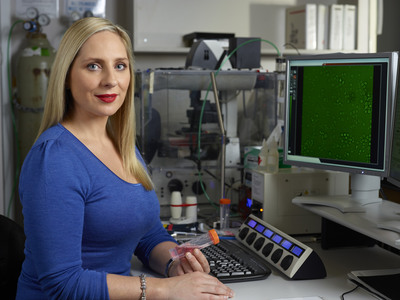T cell researcher receives L'Oréal Fellowship
Three young female scientists were this week awarded the 2013 L’Oréal for Women in Science Fellowships. One such scientist was Dr Misty Jenkins from Melbourne’s Peter MacCallum Cancer Centre, who was recognised for her work in understanding whether cancer cells emit a ‘distress call’ when under lethal attack from healthy T cells.

Chosen from 230 applicants by a panel of eminent scientists, Dr Jenkins says the $25,000 fellowship will help her build on previous research that revealed how the body’s killer T cells detach from slain cancer targets and move on to others.
“Killer T cells roam the body as an internal security force - receptors on cell surfaces alert T cells to the presence of cancerous cells, or cells infected with bacteria or viruses, provoking the T cell to dock with the cell, punch holes in its surface and deliver a lethal hit of powerful granzymes, which induce cell death,” Dr Jenkins said.
By using live cell imaging and time lapse microscopy at the cancer centre, Dr Jenkins’ colleagues developed a world-first technique of visualising the precise moment of this lethal hit, allowing her to ascertain that the actual hit takes about three minutes, while the T cell detaches and moves on within about seven minutes.
“We also found that when the number of granzymes in a T cell were reduced, the killing process was much slower and the T cells did not detach and move on,” she said.
“These weakened T cell variants remained attached to their target, leading us to believe that the stronger, or original, T cells were receiving a ‘death signal’ from the cancer cell, alerting them to the cell’s guaranteed death, prompting them to detach and move on to kill other cancerous cells.
“If we can work out whether there is a signal as we suspect, we could harness it for the development of new therapies.”
Dr Jenkins has also observed that while a T cell is attached to a target it rapidly produces compounds called cytokines, which stimulate inflammation. With the award, she aims to further her research to develop new ways of controlling the length of time T cells spend docked to their targets, to try to limit the onset of potentially deadly hyper-inflammation.
She also hopes to use the funds to start her own research group and provide childcare support for her two-year-old daughter.
Dr Chris Baldwin is new HaemaLogiX CEO and Managing Director
Having commenced in January, Dr Chris Baldwin is clinical stage Australian biotechnology company...
Vaxxas appoints former Merck Global Vaccines President David Peacock as CEO
To lead the commercialisation of Vaxxas's proprietary high‑density microarray patch (HD‑MAP)...
Optics11 Life appoints Jacquelien ten Dam as CEO
Optics11 Life plans to accelerate its commercial growth in key markets while building strategic...



